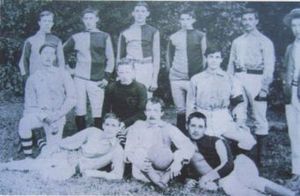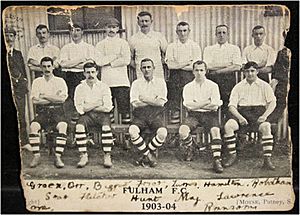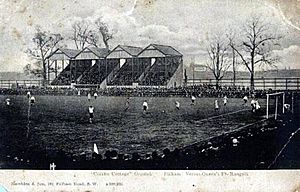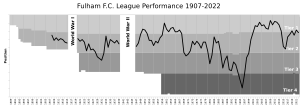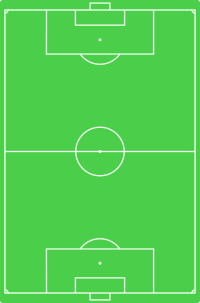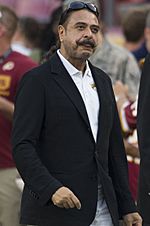Fulham F.C. facts for kids
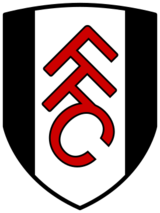 |
||||
| Full name | Fulham Football Club | |||
|---|---|---|---|---|
| Nickname(s) | The Cottagers | |||
| Founded | 1879 (as St Andrews Cricket & Football Club) | |||
| Ground | Craven Cottage | |||
| Capacity | 28,800 | |||
| Owner | Shahid Khan | |||
| Chairman | Shahid Khan | |||
| Manager | Marco Silva | |||
| League | Championship | |||
| 2018–19 | Premier League, 19th of 20 (relegated) | |||
|
||||
Fulham Football Club is a professional football team located in Fulham, West London, England. The club plays in the top league of English football. Their home games have been at Craven Cottage since 1896. For two years, they played at Loftus Road while Craven Cottage was being updated.
Fulham has local rivalries with Chelsea, Brentford, and Queens Park Rangers. The team's kit has been a white shirt and black shorts since 1903.
Founded in 1879, Fulham is London's oldest professional football club. They joined the Southern League in 1898, winning two titles there. In 1907, they joined the Football League. Fulham won the Third Division South in 1931–32 and the Second Division in 1948–49.
After being bought by Mohamed Al-Fayed in 1997, Fulham quickly rose to the Premier League by 2001. They won the UEFA Intertoto Cup in 2002 and reached the final of the UEFA Europa League in 2010. After 13 seasons in the top league, they were relegated in 2014. Since then, under new owner Shahid Khan, the club has moved between the first and second leagues. Fulham won the 2021–22 EFL Championship title and has been in the Premier League since 2022.
| Top - 0-9 A B C D E F G H I J K L M N O P Q R S T U V W X Y Z |
Club History: From Founding to Today
Early Years: 1879–1907
Fulham Football Club started in 1879 as Fulham St Andrew's Church Sunday School F.C. It was founded by church members in West Kensington. They won the West London Amateur Cup in 1887. In December 1888, the name was shortened to Fulham. They won the West London League in 1893.
One of their first kits in 1886–87 was half red and half white shirts with white shorts. Fulham began playing at their current home, Craven Cottage, in 1896. Their first game there was against Minerva.
The club became professional on December 12, 1898. They were the third London club to turn professional. In 1902–03, they were promoted to the Southern League First Division. The club's first all-white kit appeared in 1903. Since then, they have worn white shirts and black shorts. Fulham won the Southern League twice, in 1905–06 and 1906–07.
Joining the Football League: 1907–1949
Fulham joined The Football League in 1907. Their first league game in the Second Division was a 1–0 loss at home to Hull City. A few days later, they won their first league game 1–0 against Derby County. Fulham finished fourth that season, just missing promotion.
They also reached the FA Cup semi-final, but lost 6–0 to Newcastle United. This is still a record loss for an FA Cup semi-final. In 1910, the club won the London Challenge Cup.
During this time, Henry Norris was the club chairman. He also became chairman of Arsenal in 1910. Fulham was the first British team to sell hot dogs at their stadium in 1926.
After being relegated to the 3rd Division South in 1927–28, Fulham won the division in the 1931–32 season. They scored 111 goals and won 24 out of 42 games, earning promotion back to the Second Division. They nearly got promoted again the next season, finishing third.
On October 8, 1938, Craven Cottage saw its biggest crowd ever, with 49,335 fans watching a match against Millwall. Football was stopped during World War II. After the war, in the 1948–49 season, Fulham finished first in the Second Division and were promoted.
Top Tier Football: 1949–1970
Fulham struggled in the top league, finishing 17th and 18th in their first two seasons. In their third season, 1951–52, they finished last and were relegated.
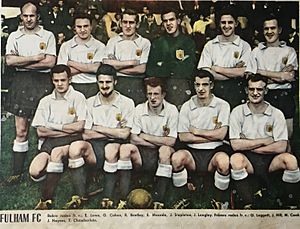
Johnny Haynes, known as "Mr. Fulham," joined the club as a schoolboy in 1950. He played for 18 years, making 657 appearances, which is a club record. Many consider him the greatest player in Fulham's history. He played 56 times for England, often while playing for Fulham in the Second Division. The Stevenage Road Stand at Craven Cottage was renamed in his honor after he passed away in 2005.
Fulham reached the 1957–58 FA Cup semi-finals, their best cup run with Haynes. They were promoted back to the First Division in the 1958–59 season. In the 1959–60 season, they finished tenth, which was their highest league position until 2003–04. They also reached another FA Cup semi-final in 1962.
The club often fought against relegation, with many close calls. However, they were relegated in the 1967–68 season and then again to the Third Division the next season.
Ups and Downs: 1970–1994
Fulham spent only two seasons in the Third Division before being promoted back to the Second Division in 1970–71. In 1975, Fulham reached their only FA Cup final, losing 2–0 to West Ham United at Wembley Stadium.
Famous players like George Best and Rodney Marsh played for the club in the mid-1970s.
The club was relegated again in 1979–80. With a strong team, they won promotion back to the Second Division in 1981–82. In 1980, Fulham started a rugby league club, now called London Broncos, which played at Craven Cottage for a few years.
Gordon Davies became the club's all-time leading goalscorer with 178 goals. Fulham almost got promoted to the First Division in 1982–83, but lost on the last day. The club faced financial problems and nearly went out of business in 1987. Former player Jimmy Hill helped save the club.
In 1992, the Premier League was formed, and Fulham was placed in the Football League's Second Division. However, they were relegated to the new Third Division after the 1993–94 season.
Lowest Point and New Ownership: 1994–2001
In the 1995–96 season, Fulham finished 17th, their lowest-ever league position. Micky Adams became player-manager in February 1996 and helped the team avoid relegation. The next season, they finished second, just missing first place.
In the summer of 1997, Egyptian businessman Mohamed Al-Fayed bought the club. He aimed to get the club into the Premier League within five years. Kevin Keegan took over as manager in 1998 and led the team to promotion the next season, earning 101 points.
Keegan left in 1999 to manage England. Jean Tigana became manager in 2000. He signed young stars like Louis Saha and guided Fulham to their third promotion in five seasons in 2000–01. Fulham again earned 101 points, a record they hold twice.
Premier League Years: 2001–2007
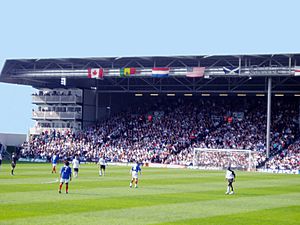
Fulham played in the Premier League for the first time in the 2001–02 season, finishing 13th. Due to rules about all-seater stadiums, Fulham had to share Loftus Road with QPR for two seasons (2002–03 and 2003–04) while Craven Cottage was rebuilt.
In 2002–03, Fulham was struggling. Manager Jean Tigana was dismissed, and former player Chris Coleman took temporary charge. Fulham won enough points to avoid relegation, and Coleman was appointed permanent manager. He led them to a club record ninth-place finish in his first season, 2003–04.
Coleman continued to guide Fulham to safe finishes, including 13th in 2004–05 and 12th in 2005–06. A highlight was a 1–0 win over local rivals Chelsea. Coleman's time ended in April 2007, and Lawrie Sanchez took over. Fulham avoided relegation that season by winning their second-to-last match.
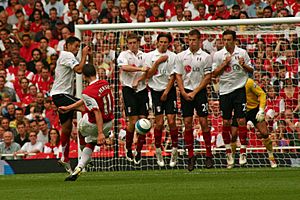

Roy Hodgson's Impact: 2007–2010
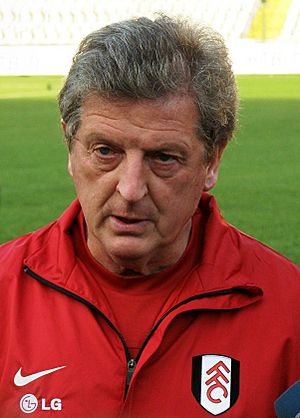
Roy Hodgson became Fulham's new manager in December 2007. The team was in the relegation zone and struggled at first. A turning point came in April 2008, when Fulham came back from 2–0 down to beat Manchester City 3–2. They then won a crucial game against Birmingham City.
In the final match, Danny Murphy scored a late goal against Portsmouth, securing Fulham's survival in the Premier League. Hodgson achieved this against tough odds.
In the 2008–09 season, Fulham finished seventh, their highest-ever league position. This earned them a spot in the new UEFA Europa League.
The 2009–10 season was one of the club's most successful. Fulham reached the final of the UEFA Europa League, beating famous teams like Juventus. In the final, they lost 2–1 to Atlético Madrid after extra time. Hodgson was named the LMA Manager of the Year for this amazing achievement. At the end of the season, Hodgson left Fulham.
Premier League Stability: 2010–2013
Mark Hughes became manager in July 2010. A highlight was a 4–0 FA Cup win over Tottenham Hotspur. Hughes resigned in June 2011, after less than a year. Fulham finished eighth and qualified for the Europa League.
Martin Jol took over in June 2011. Fulham reached the group stage of the Europa League but were knocked out in the final seconds. In the 2011–12 season, Fulham had a mixed performance. They had a big 6–0 home win over QPR, with Andrew Johnson scoring three goals.
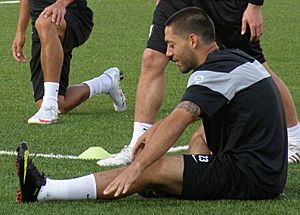
Clint Dempsey scored two hat-tricks in the New Year. Pavel Pogrebnyak also scored a hat-trick in a 5–0 win against Wolverhampton Wanderers. Fulham finished the season strongly.
In the 2012–13 season, Fulham finished 12th.
Shahid Khan's Era: 2013–Present
Shahid Khan became chairman in July 2013. After a poor start to the 2013–14 season, Martin Jol was dismissed. René Meulensteen and then Felix Magath took charge, but results did not improve. Fulham was relegated to the Championship in May 2014.
After a bad start to the next season, Magath was dismissed. Kit Symons took over, and Fulham finished 17th. After another inconsistent start, Symons was dismissed in November 2015. Slaviša Jokanović was appointed in December 2015. Fulham avoided relegation in 2015–16.
The 2016–17 season saw big improvements. Fulham finished sixth and entered the play-offs, but lost in the semi-final. Shahid Khan's son, Tony Khan, became Vice Chairman. The next season, the club had a record 23-game unbeaten run in the league, finishing third. They then won the EFL Championship play-off final against Aston Villa to return to the Premier League.
During this time, Aleksandar Mitrović joined the club and went on to score over 100 goals for Fulham.
After a poor start back in the Premier League, Jokanović was dismissed in November 2018 and replaced by Claudio Ranieri. Results did not improve, and Ranieri left in February 2019. Scott Parker became caretaker manager, but could not save the club from relegation in April 2019. Parker was appointed permanent manager and led the club back to the Premier League in August 2020, winning the play-off final against Brentford. However, they were relegated again after just one season in May 2021.
After relegation, Parker left, and Marco Silva became manager. Under Silva, Fulham earned promotion back to the top league with four games to spare, winning the 2021–22 Championship title. Fulham started the 2022–23 Premier League season much better, reaching 6th place at the halfway point. They also beat West London rivals Chelsea 2–1, a win they had not achieved in nearly 16 years. The following season, the club reached the semi-finals of the EFL Cup for the first time. In the 2024–25 season, they set a new club Premier League record for points.
Home Grounds
Between 1879 and 1896, Fulham played at many different locations before settling at Craven Cottage. Some of these early places were likely parks. Even after buying Craven Cottage in 1894, they had to wait two years to play there.
- 1879–1883: 'The Mud Pond', Star Road, Fulham
- 1883–1886: Lillie Road, Fulham
- 1886–1888: Ranelagh House, Fulham
- 1888–1889: Barn Elms Playing Fields, Barnes
- 1889–1891: Parsons Green, Fulham and Roskell's Fields
- 1891–1895: The Half Moon, Putney
- 1895–1896: Captain James Field, near Halford Road, West Brompton
- 1896–2002: Craven Cottage, Fulham
- 2002–2004: Loftus Road, Shepherd's Bush (shared with Queens Park Rangers during Craven Cottage's renovation)
- 2004–present: Craven Cottage, Fulham
Club Identity
Team Kit and Sponsors
Fulham's sponsorship by Betfair in 2002–03 was the first of its kind in English football. Over the years, Fulham has had various kit manufacturers and shirt sponsors.
| Period | Kit manufacturer | Shirt sponsor (chest) | Shirt sponsor (sleeve) | Shirt sponsor (back) | Shorts sponsor |
|---|---|---|---|---|---|
| 1974–1977 | Umbro | None | None | None | None |
| 1977–1981 | Adidas | ||||
| 1981–1984 | Osca | ||||
| 1984–1985 | Umbro | William Younger | |||
| 1985–1987 | Prestige Travel | ||||
| 1987 | Scoreline | None | |||
| 1988 | Emirates | ||||
| 1988–1990 | TeleConnect | ||||
| 1990–1991 | Ribero | ||||
| 1991–1992 | None | ||||
| 1992–1993 | DMF Sportswear | ||||
| 1993–1996 | Vandanel | GMB | |||
| 1996–1997 | Le Coq Sportif | ||||
| 1997–1998 | Adidas | ||||
| 1998–2001 | Demon Internet | ||||
| 2001–2002 | Pizza Hut | ||||
| 2002–2003 | Betfair.com | ||||
| 2003–2005 | Puma | dabs.com | |||
| 2005–2006 | Pipex | ||||
| 2006–2007 | Airness | ||||
| 2007–2010 | Nike | LG | |||
| 2010–2013 | Kappa | FxPro | |||
| 2013–2015 | Adidas | Marathonbet | |||
| 2015–2017 | Visit Florida | ||||
| 2017–2018 | Grosvenor Casinos | Pro Evolution Soccer | GameTime Hydration | ||
| 2018–2019 | Dafabet | ICM.com | None | None | |
| 2019–2020 | None | Skilling | RingCentral | ||
| 2020–2021 | BetVictor | ClearScore | None | None | |
| 2021–2022 | World Mobile | None | Spreadex Trading | ||
| 2022–2023 | W88 | World Mobile | None | ||
| 2023–2024 | SBOBET | WebBeds | |||
| 2024– | Go MonGOlia (in FA Cup matches) |
Team Mascot
Fulham's mascot is Billy the Badger. He wears a Fulham shirt with the number 79, which refers to the club's founding year, 1879. Billy has been involved in some funny moments, like trying to cheer up a rival manager and being "sent off" for break-dancing during a game. The club's former mascot was Sir Craven of Cottage, a knight.
Rivalries and Supporters
Fulham fans see Chelsea as their main rivals. Their stadiums are very close, only 1.8 miles apart.
Queens Park Rangers are Fulham's second main rivals. Fulham beat QPR twice in the 2011–12 Premier League season, including a 6–0 win at Craven Cottage.
Fulham's third closest rivalry is with Brentford. Fulham defeated Brentford 2–1 in the Championship play-off final in 2020. Fulham also has smaller rivalries with other London clubs like Crystal Palace.
Gillingham is also considered a rival by some Fulham supporters, even though they haven't played in the same league for many years.
Fulham's fan base has grown with the club's success. Fans played a key role in keeping the club at Craven Cottage when it temporarily moved to Loftus Road. Fulham supporters traditionally come from the Fulham and Hammersmith areas, and other parts of South-West London.
In 2012, the club website asked fans to pick their best Fulham Premier League team from 2001 onwards. In 2022, fans were asked for an updated all-time Premier League XI.
Club Records and Statistics
Fulham in European Competitions
Fulham has played in European competitions four times. They are unbeaten at home in European games, with 17 wins and six draws in 23 matches. In 2010, Fulham reached the UEFA Europa League final, where they lost 2–1 to Atlético Madrid.
Players
Current Squad
|
|
Academy and Women's Team
Fulham has an Academy that trains young players. The club also has a women's team, Fulham F.C. Women.
Club Management
Coaching Staff
| Position | Name |
|---|---|
| Manager | Marco Silva |
| Assistant manager | Stuart Gray |
| Goalkeeping coach | Hugo Oliveira |
| Fitness coach | Goncalo Pedro |
| First-team analyst | Antonios Lemonakis |
| Head of performance | Bruno Mendes |
| Academy director | Mike Cave |
| Under-23s head coach | Steve Wigley |
| Under-18s head coach | Ali Melloul |
Managerial History
Fulham has had 37 managers in its history. Before 1904, the club secretary and captain shared the manager's duties.
| Name | From | To |
|---|---|---|
| Harry Bradshaw | 1904 | 1909 |
| Phil Kelso | 1909 | 1924 |
| Andy Ducat | 1924 | 1926 |
| Joe Bradshaw | 1926 | 1929 |
| Ned Liddell | 1929 | 1931 |
| Jimmy McIntyre | 1931 | 1934 |
| Jimmy Hogan | 1934 | 1935 |
| Jack Peart | 1935 | 1948 |
| Frank Osborne* | 1948 | 1949 |
| Bill Dodgin Sr. | 1949 | 1953 |
| Frank Osborne* | 1953 | 1956 |
| Doug Livingstone | 1956 | 1958 |
| Bedford Jezzard | 1958 | 1964 |
| Vic Buckingham | 1965 | 1968 |
| Bobby Robson | 1968 | 1968 |
| Bill Dodgin Jr. | 1969 | 1972 |
| Alec Stock | 1972 | 1976 |
| Bobby Campbell | 1976 | 1980 |
| Malcolm Macdonald | 1980 | 1984 |
| Ray Harford | 1984 | 1986 |
| Ray Lewington | 1986 | 1990 |
| Alan Dicks | 1990 | 1991 |
| Don Mackay | 1991 | 1994 |
| Ian Branfoot** | 1994 | 1996 |
| Micky Adams | 1996 | 1997 |
| Ray Wilkins | 1997 | 1998 |
| Kevin Keegan† | 1998 | 1999 |
| Paul Bracewell | 1999 | 2000 |
| Jean Tigana | 2000 | 2003 |
| Chris Coleman | 2003 | 2007 |
| Lawrie Sanchez | 2007 | 2007 |
| Roy Hodgson | 2007 | 2010 |
| Mark Hughes | 2010 | 2011 |
| Martin Jol | 2011 | 2013 |
| René Meulensteen§± | 2013 | 2014 |
| Felix Magath | 2014 | 2014 |
| Kit Symons | 2014 | 2015 |
| Slaviša Jokanović± | 2015 | 2018 |
| Claudio Ranieri | 2018 | 2019 |
| Scott Parker± | 2019 | 2021 |
| Marco Silva± | 2021 | Present |
- * Frank Osborne worked for the club from 1948 to 1963, but was only the main manager during the times listed.
- ** Ian Branfoot stayed at the club after he was no longer manager.
- † Kevin Keegan was a chief operating officer, acting like an assistant manager, while Ray Wilkins was the main manager.
- § René Meulensteen was a head coach under Martin Jol. He took on manager duties after Jol left but was never officially called "manager."
- ± Some managers, like René Meulensteen, Slaviša Jokanović, Scott Parker, and Marco Silva, were officially called "head coach" instead of "manager."
Managerial Records:
- Only Frank Osborne has managed the club twice.
- Phil Kelso was Fulham's longest-serving manager, for 15 years (1909–1924).
- Several managers have stayed for less than a year.
Temporary Managers:
- Johnny Haynes: Briefly took over in 1968.
- Karl-Heinz Riedle: Managed temporarily in 1999–2000.
- Chris Coleman: Became caretaker manager in 2003 and then the full-time manager.
- Lawrie Sanchez: Took control for the last five games of the 2006–07 season.
- Ray Lewington: Was temporary manager in 2007 and 2010.
- Kit Symons: Took temporary charge in 2014 before being appointed permanently.
- Peter Grant: Managed for three games in 2015.
- Stuart Gray: Took over after Peter Grant in 2015.
- Scott Parker: Became caretaker manager in 2019 before being appointed permanently.
Club Ownership
| Position | Name |
|---|---|
| Chairman | Shahid Khan |
| Chief executive officer | Alistair Mackintosh |
| Finance director | Sean O'Loughlin |
| Non-executive director | Mark Lamping |
Fulham Football Club is owned by Shahid Khan. He bought the club from Mohamed Al-Fayed in July 2013.
During his time as owner, Mohamed Al-Fayed provided the club with a lot of money through interest-free loans. By January 2013, Fulham was almost debt-free because Al-Fayed turned these loans into ownership in the club.
Club Honours and Achievements
- Source:
League Titles
- Second Division / First Division / Championship (Second Tier)
- Champions: 1948–49, 2000–01, 2021–22
- Runners-up: 1958–59
- Play-off winners: 2018, 2020
- Third Division South / Third Division / Second Division (Third Tier)
- Champions: 1931–32, 1998–99
- Runners-up: 1970–71
- Promoted: 1981–82
- Third Division (Fourth Tier)
- Runners-up: 1996–97
Cup Achievements
- FA Cup
- Runners-up: 1974–75
- UEFA Europa League
- Runners-up: 2009–10
- UEFA Intertoto Cup
- Winners: 2002
Other Titles
- Southern League First Division
- Champions: 1905–06, 1906–07
- Southern League Second Division
- Champions: 1901–02, 1902–03
- Western League Division One Section A
- Champions: 1906–07
- West London League
- Champions: 1892–93
- London Challenge Cup
- Winners: 1909–10, 1931–32, 1951–52
- West London Cup
- Winners: 1886–87, 1890–91 1892–93
- London Fives Tournament
- Winners: 1955, 1957, 1982
See also
 In Spanish: Fulham Football Club para niños
In Spanish: Fulham Football Club para niños
 | Tommie Smith |
 | Simone Manuel |
 | Shani Davis |
 | Simone Biles |
 | Alice Coachman |


